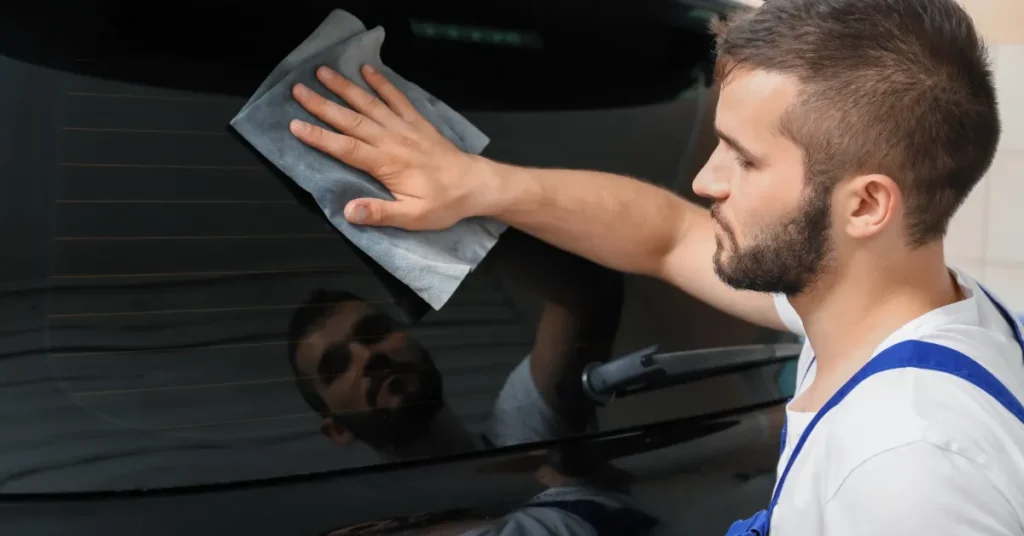Table of Contents
1 Introduction
Maintaining tinted car windows is crucial for both practical and aesthetic reasons. In this article, we will explore the importance of keeping your tinted windows clean and the benefits it brings to visibility and the overall appearance of your vehicle.
2 Importance of Maintaining Tinted Car Windows

Tinted car windows offer various advantages, such as reducing glare, blocking harmful UV rays, and providing privacy. However, to fully enjoy these benefits, it is essential to maintain the cleanliness of your tinted windows. Regular cleaning not only ensures optimal visibility but also helps prolong the lifespan of the tinting film.
3 Benefits of Clean Windows for Visibility and Appearance

Clean windows play a significant role in enhancing visibility while driving. Dust, dirt, and smudges on tinted windows can obstruct your view, making it difficult to spot potential hazards on the road. By keeping your windows clean, you can ensure a clear and unobstructed view, thus improving your safety on the road.
In addition to improving visibility, clean windows also contribute to the overall appearance of your vehicle. Dirty and grimy windows can make your car look neglected and unappealing. On the other hand, regularly cleaning your tinted windows gives your vehicle a polished and wellmaintained look, boosting its curb appeal.
When it comes to visibility, it is essential to consider the impact of various weather conditions on your tinted windows. For example, during rainy weather, water droplets can accumulate on the windows, which can further hinder your visibility. Regular cleaning helps remove these water droplets, ensuring a clear view of the road.
To maintain the appearance of your tinted windows, it is crucial to address any scratches or damages promptly. Even minor scratches can disrupt the smooth surface of the tinting film, affecting its aesthetics and potentially leading to further damage. By addressing these issues promptly through proper cleaning and maintenance, you can ensure that your tinted windows remain visually appealing and in optimal condition.
4 What Tinted Car Windows Are
Tinted car windows are windows that have been treated with a thin film that reduces the amount of light and heat that penetrates the glass. This film is typically made of polyester or a combination of metals and dyes. Tinted windows provide various benefits, including reducing glare, protecting against harmful UV rays, and enhancing privacy.
5 Different Types of Tinting Films Available
There are several types of tinting films available for car windows, each with its unique characteristics. Understanding the different options can help you make an informed decision based on your specific needs.
Dyed Film: Dyed film is the most affordable option and provides good heat and glare reduction. It works by absorbing solar heat and reducing the amount of light that passes through the windows. However, dyed film may fade over time and may not provide as much heat rejection as other types of films.
Metallic Film: Metallic film contains tiny metallic particles that reflect heat and block UV rays. This type of film offers enhanced heat rejection, making it an excellent choice for hot climates. However, metallic film may interfere with electronic signals, such as those used for GPS or mobile devices.
Carbon Film: Carbon film is known for its excellent heat rejection properties and durability. It blocks a significant amount of heat and UV rays while maintaining signal clarity. Additionally, carbon film is less likely to fade or change color over time compared to dyed film.
Ceramic Film: Ceramic film is considered the topoftheline option for tinted car windows. It offers superior heat rejection, blocks almost all UV rays, and does not interfere with electronic signals. Ceramic film is also highly resistant to fading, ensuring longlasting performance and aesthetics.
6 Observe Care Instructions Provided by the Installer

After installing tinted windows, it is crucial to follow the care instructions provided by the installer. These instructions may vary depending on the type of tinting film used. By adhering to the recommended care routine, you can help preserve the film’s integrity and ensure its longevity.
To maintain the cleanliness of your tinted windows, use gentle cleaning products specifically designed for automotive use. Avoid using harsh chemicals or abrasive materials that can damage the tinting film. Additionally, use a soft microfiber cloth or sponge to prevent scratches while cleaning.
Regularly inspect your tinted windows for any signs of damage, such as peeling or bubbling. If you notice any issues, contact a professional tinting service to address the problem promptly. Proper maintenance and care will not only keep your tinted windows in optimal condition but also maximize their benefits for years to come.
Remember, clean and well maintained tinted car windows not only enhance visibility and protect against harmful UV rays but also add a touch of sophistication to your vehicle. By investing in regular cleaning and maintenance, you can enjoy the full advantages of tinted windows while keeping your car looking its best.
7 FAQ
1. Why is it important to maintain tinted car windows?
Regular maintenance of tinted car windows ensures optimal visibility, prolongs the lifespan of the tinting film, and enhances the overall appearance of your vehicle.
2. How do clean windows contribute to visibility while driving?
Dust, dirt, and smudges on tinted windows can obstruct your view, making it difficult to spot potential hazards on the road. By keeping your windows clean, you can ensure a clear and unobstructed view, improving your safety on the road.
3. How do clean windows enhance the appearance of a vehicle?
Dirty and grimy windows can make your car look neglected and unappealing. Regularly cleaning your tinted windows gives your vehicle a polished and well-maintained look, boosting its curb appeal.
4. What are the different types of tinting films available for car windows?
The different types of tinting films available for car windows include dyed film, metallic film, carbon film, and ceramic film. Each type has its unique characteristics and benefits, such as heat and glare reduction, UV protection, and signal clarity.













